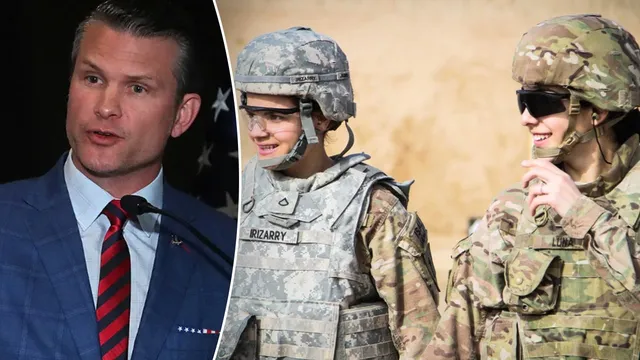
Pete Hegseth ends Women, Peace and Security program signed by Trump
2025-04-29 17:43- Pete Hegseth announced the end of the Women, Peace and Security program that was originally signed into law by President Trump.
- The program aimed to enhance women's roles in security and conflict resolution and received bipartisan support.
- The termination of this program has sparked criticism from various lawmakers questioning Hegseth's understanding and qualifications.
Express your sentiment!
Insights
In April 2025, Pete Hegseth, the Defense Secretary of the United States, publicly announced the termination of the Women, Peace and Security (WPS) program which was established by legislation signed by President Donald Trump in 2017. This program was aimed at recognizing and promoting the crucial role women play in achieving security, especially in conflict situations. Hegseth's assertion that the program was a 'woke' initiative, aligning it with Democratic policies, contradicted its bipartisan support and the positive impact noted by military leaders, including the new Chairman of the Joint Chiefs, General Dan Caine. The Women, Peace and Security Act was not an initiative of the Biden administration, as suggested by Hegseth, but was celebrated during Trump’s presidency. It emerged from a United Nations resolution that called for women’s inclusion in peace processes, highlighting their importance in conflict resolution and community stability. When the program was operational, military officials reported its success in aiding local engagements, where female soldiers interacted with women and children in conflict zones, thus enhancing cultural understanding and operational effectiveness. Following Hegseth's announcement, immediate criticism arose from Democratic lawmakers who questioned not only his statement's accuracy but also his overall competence as Defense Secretary. His comments were cited as a sign of ignorance regarding the program’s bipartisan origins and operational benefits. Figures such as Senator Tim Kaine and Senator Jeanne Shaheen asserted that Hegseth's remarks were not befitting of a high-ranking Defense official. In his social media posts, Hegseth claimed that the WPS program burdened military personnel and distracted them from essential tasks, labeling it merely a social justice initiative. In subsequent remarks, he attempted to clarify his stance, stating that the Biden administration had altered the WPS initiative from its original security-focused intent. Despite criticism, he vowed to continue working to dismantle what he viewed as an undesired program, indicating a significant shift in the approach to military and gender-related initiatives under his leadership.
Contexts
The Women, Peace and Security (WPS) agenda is a significant global initiative that addresses the critical role of women in promoting peace and security. Established primarily through United Nations Security Council Resolution 1325 in 2000, the WPS agenda recognizes that sustainable peace and security cannot be achieved without the full and meaningful participation of women at all levels of decision-making. Over the years, the program has evolved to integrate gender perspectives within peace processes, conflict resolution, and post-conflict reconstruction efforts, advocating for women's rights, protection, and participation in all security-related matters. The impact of the WPS program has been multifaceted, influencing policy frameworks, institutional structures, and community practices. Implemented in various conflict and post-conflict settings, the WPS agenda has led to the establishment of national action plans in numerous countries, ensuring that women's voices are heard in peace negotiations and security deliberations. Furthermore, women’s participation in peace processes has been shown to lead to more durable and inclusive peace agreements, ultimately contributing to a reduction in violence and a more cohesive society. As the program expands, it fosters local leadership among women, promoting their roles as peacebuilders and agents of change within their communities. Another critical aspect of the WPS program is its focus on preventing and addressing gender-based violence in conflict situations. This includes advocating for the protection of women and girls from violence, exploitation, and abuse during wartime, as well as addressing the long-term impacts of such violence through legal and social support systems. Governments and organizations are increasingly adopting policies and practices that aim to protect women's rights in armed conflict, and initiatives are underway to train peacekeepers on gender sensitivity, aiming to create safer environments for women in conflict-affected areas. In summary, the impact of the Women, Peace and Security program is evident in its promotion of gender equality, women’s empowerment, and increased participation in decision-making processes. While challenges remain, including the need for greater political will and resources to sustain and scale these efforts, the WPS agenda provides a comprehensive framework for addressing the complexities of conflict and the vital role that women play in promoting peace. As societies move towards resilience and recovery, the ongoing support for and investment in the WPS agenda will be crucial for achieving long-lasting peace and security for all.